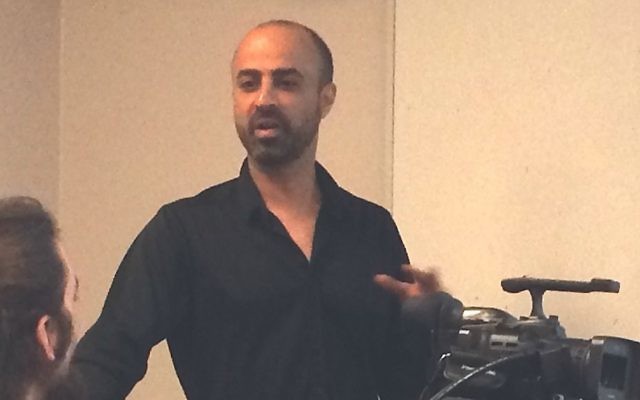Nitzan Gilady: The Filmmaker as Outsider
Gilady encourages aspiring filmmakers to tell their truth
Noted Israeli filmmaker Nitzan Gilady has been lecturing this spring semester to a small group of Emory undergraduates with little or no experience in filmmaking.
His three-month course at the university is “Constructing Reality in Israeli Documentary Films,” something he has done successfully for 20 years. The past two decades, his work has been shown at 120 film festivals and won 13 international awards.
But on a recent Wednesday afternoon he was hard at work behind a small video camera in a nondescript, windowless classroom, trying to get his student group of film beginners to understand the secret of his success.
“The most important gift you can give as a filmmaker is the gift of truth,” he said. “There is no absolute truth. It is the truth of how you see things and how you feel about it.”
But getting at the truth, or constructing reality, as he prefers to call it, has not been easy.
He chased the truth in the shadowy world of a New York Hasidic sect with 2003’s “In Satmar Custody.” Then he found himself in the middle of a furious battle in Jerusalem a decade ago with “Jerusalem Is Proud to Present,” his documentary about the city’s first gay pride parade.
What made that documentary the most difficult film crafted by this tall son of Yemenite immigrant parents was that neither his conservative father nor his mother nor anyone other than a few close friends knew he was gay. Concealing his sexual orientation took its toll.
“For two years after, I had this weird feeling in my stomach. I was afraid,” Gilady said.
After the film became a hit, he summoned up the courage to tell his parents the truth about himself. He was 35.
“If I would blame anyone” for his concealing the truth for so long, “I would blame myself for not being able to stand up for myself. You should be able to take your own place in society just like everyone else.”
For four months this semester the Israeli film writer and director is a Schusterman visiting Israeli artist in Emory’s film and media studies department.
His stay is part of a program sponsored by the Israel Institute in Washington, which this academic year is bringing 19 Israeli artists to campuses across the country.
To local audiences, Gilady is perhaps best known for his first narrative feature, “Wedding Doll,” a big hit at the 2016 Atlanta Jewish Film Festival. It’s a charming and tender romance between a young woman with a developmental disability and the son of the owner of the factory where she works.
The film won two Israeli Academy Awards in 2016.
As part of his semester in Atlanta, the Emory Cinematheque is sponsoring a free retrospective of five of his films, starting with “Wedding Doll” in White Hall at 7:30 p.m. Wednesday, March 15.
The common thread that runs through the five films and much of Gilady’s work is the role of the outsider who is never quite able to fit in.
He describes himself as an outsider. He is an Israeli born into the large community of immigrants who came from Arab lands in the late 1940s and 1950s and have struggled for acceptance in Israel’s multiethnic population.
“I connect with people who are outsiders,” Gilady said. “I know exactly what they go through. I know how difficult it is to be different.”
The other Emory screenings are “The Last Enemy,” “In Satmar Custody,” “Jerusalem Is Proud to Present,” and a highly personal film from 2012, “Family Time.”
“Family Time” tells the story of Gilady’s weeklong family trip to the Grand Canyon in a small RV. During the journey, each family member is confronted by some of the painful truths of family life.
One of his brothers faces the truth of his flight from Israel to a life in America. Another brother confronts his post-traumatic stress disorder, the result of Israeli military service. Gilady, during the making of the film, has his first real conversation with his parents about his sexual identity.
“I thought I was going to die when I first showed the documentary to my parents. I was sitting behind them shaking,” he said. “During the film my father was dabbing at his eyes, and I knew he was crying.”
In the end, though, truth wins out, just as in his movies.
“They said they loved the film,” Gilady said, “but what they meant is ‘We love you. We accept you, and we love you.’ For me, it was amazing, and it was unbelievable”
On March 28, Bob Bahr begins a six-week class on Tuesday mornings at Temple Sinai in Sandy Springs, “In Search of Three Jews: Steven Spielberg, Sidney Lumet and Woody Allen at the Movies.” Tuition is $49, and it is open to the public (bit.ly/2mtZYDu).




comments